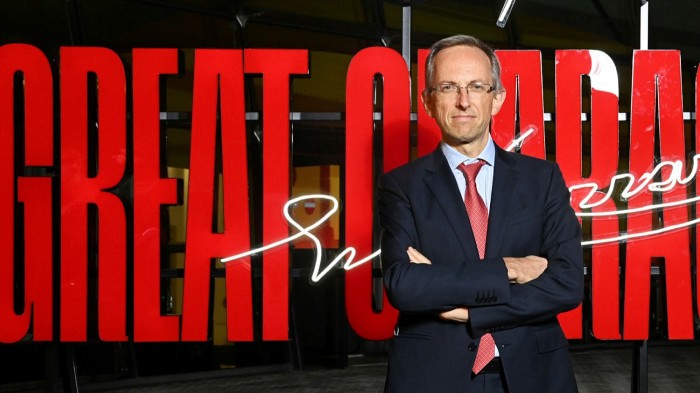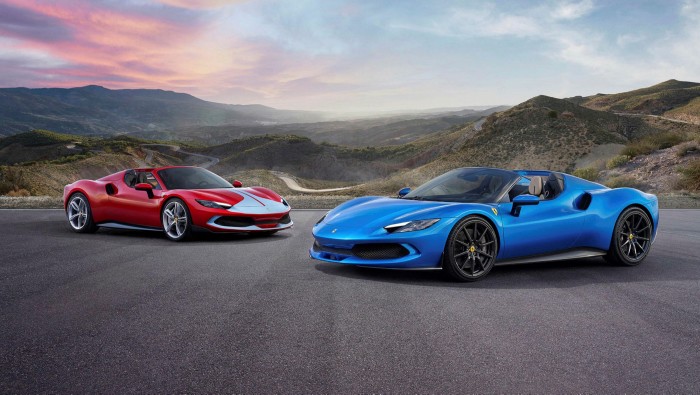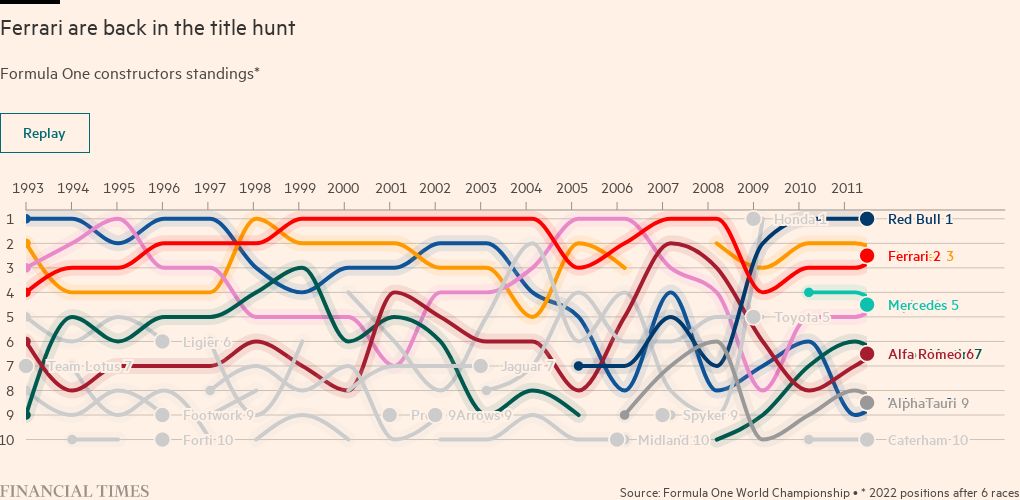Ferrari’s Benedetto Vigna: ‘We are in a period of technology transition’

Roula Khalaf, Editor of the FT, selects her favourite stories in this weekly newsletter.
When Benedetto Vigna was 14 years old, he sneaked out of the family home in southern Italy and travelled with a friend to Imola to watch the 1983 San Marino Grand Prix — a round trip of almost 1,000 miles. His anxious parents had no idea where he was and, without mobile phones, it stayed that way until he returned two days later. The race was won by a Ferrari.
Vigna went on to a stellar career in technology with STMicroelectronics, a Geneva manufacturer — during which he invented the motion sensor at the heart of the Nintendo Wii console and Apple’s iPhone 4.
But, then, last autumn, the 53-year-old strode into Ferrari’s Maranello headquarters as its new chief executive.
“I am a technologist, but I am an Italian technologist,” he explains. “So, as an Italian, I always had a great passion for racing. This is true all my life. And it’s an honour for me to be at the helm of this company. I always dreamt about it. I never thought I could arrive.
“But I remember, when I was going to school, on my backpack there was a red Ferrari with a yellow driver helmet. Now, as a technologist, I am fascinated [by] all the different kinds of technologies that we deploy in F1 and also how we can deploy these technologies in the road car.”
Ferrari’s fortunes on the track are not just cyclical, they are a rollercoaster. The company dominated the sport with Michael Schumacher 20 years ago. After that, there were several false dawns and near misses, which meant that Ferrari’s last F1 world drivers’ championship win was in 2007.
However, this season it is a contender again, with a bullet of a car designed to F1’s new technical regulations. Its lead driver Charles Leclerc is locked in a battle for the world title against Max Verstappen, Red Bull’s reigning champion.
Vigna’s role, though, is to look ahead. He has not been brought in to help Ferrari produce or sell its current range of luxury cars. Last year, it shipped a record 11,155 models and there is a strong order book for 2023. Ferrari shares, since listing in New York at $52 in October 2015, have risen fourfold.
Instead, the Italian was headhunted to ensure Ferrari does not make a mis-step as it adopts the technologies that will be critical to its future.
The first electric Ferrari will be unveiled in 2025. So, while it seems that the adage “win on Sunday, sell on Monday” — which car manufacturers trot out to justify investment in motorsport — does not apply to Ferrari, Vigna is quick to point out that the link between F1 and quality road cars is about more than marketing,
“A lot of technologies we developed for F1 are transferred to the road cars. So, if you want, the benefit is indirect,” he says. “Today, we have the broadest and most innovative sports car range. We also leverage a lot of the hybrid technologies we have been developing in F1 for 15 years.

“This is why the success of the 296 [the new hybrid convertible Ferrari] is very good. So it’s not a direct consequence but clearly winning in F1 is testament that our technologies are good.
“Competition is part of the game and the differences are very small. So we have to continually fight to optimise our technologies.”
F1 hybrid engines are already among the most efficient motors on the planet, with more than 50 per cent of the available energy from the fuel driving the rear wheels — far more than any road cars.
More from this report
America starts to fall in love with Formula One
F1 begins to purr as changes revolutionise motor racing
Cost cap ushers in return to profitability in Formula 1
Right place, wrong time? Drive to Survive star George Russell arrives at Mercedes
Hope of a 100% green fuel leads Formula One’s efforts to tackle climate change
Hamilton inspires industry to accelerate F1 diversity initiatives
Optimistic Michael Andretti knocks on F1’s door . . . but will the other teams let him in?
The next step will be the game-changer in F1’s mission to decarbonise motorsport: the shift in 2026 to 100 per cent sustainable fuels.
It is a move that will transform F1’s relevance and looks set to attract Porsche, Ferrari’s longstanding rival, into the sport.
“All of us, all the companies, have an important responsibility in front of the world that we have to respect,” says Vigna. “We are in a period of technology transition. I think that we have to explore all the avenues possible of high efficiency,” he adds.
“Sustainable fuels is a big one that we have to keep in mind — we are pushing on that.”
Vigna is well aware of Ferrari’s pedigree. Enzo Ferrari, the company’s founder, who died aged 90 in 1988, was a racing driver and team owner before he built his first road car. Under Vigna, the race team appears to be well aligned with the road car business.
Another tradition that began with Enzo continues to this day. “Here, in Maranello, when we win on Sunday the local church rings the bell and all the people come out of their homes,” Vigna says.
“And I can tell you that, on Monday morning, when you’re in the office, if you win the race, you can smell and taste the sense of pride of all the people. It means a lot. Competition is part of the DNA of this company.”
FT Scoreboard
Sign up to the FT’s weekly newsletter covering the multi-billion-dollar global sports industry. www.ft.com/scoreboard

Comments